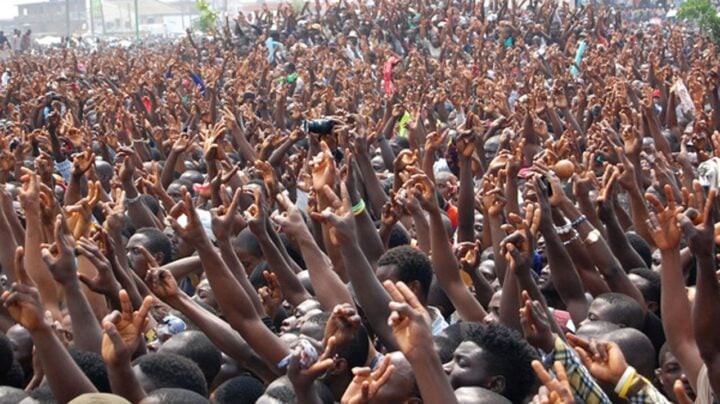On Monday, the police public relations officer in Ogun state, deputy superintendent of police, Abimbola Oyeyemi, gave the preachment of the season. The sermon was in Abeokuta where the state police command paraded four teenagers suspected to have killed Sofiat, a girlfriend to one of them for ritual purposes.
After leading the suspects, including the erstwhile fleeing mastermind of the crime, Soliu Majekodunmi, through a media session where they gave details of their alleged crime, Oyeyemi attempted a diagnosis of the foundation of the increasing obsession of young Nigerians with premature wealth and the good life. In the end, he took a hit at three institutions of socialisation, which seemed to have failed in their responsibilities.
Hear him: “I want to say that many parents have failed in their responsibilities. This is a result of bad parenting. It is a result of complete failure of parental responsibility because if this thing has not been encouraged by the parents, I do not believe that any properly brought up child will want to embark on this type of criminality.
“I also want to advise that the generality of people have a lot of work to do, the religious bodies, entertainment bodies and everybody that has one thing or the other on protecting life and properties.
Advertisement
“The religious bodies should stop preaching only prosperity. You should be preaching morality more than the way you preach prosperity. Nollywood actors and the movie censors board have a lot to do to regulate the type of film they produce because some of them (ritual suspects) learn it in movies.”
Now, except for the fact that if anyone complains about the cost of dry-cleaning, it should not be the bedwetter who has loads of stinking attires, the good policeman made some good points. Many of those who adorn the uniform of the Nigerian Police are not better inclined than the boys on parade, which is why the average Nigerian has no confidence in men of the uniform. But that is a matter for another day. Regardless, there is no doubt that parents, religious institutions and, possibly, the entertainment industry have a lot of work to do concerning re-orienting the Nigerian child and youth. There is another viral video, where a 13-year-old was part of a three people crew that left Delta state to “hustle” and engage in yahoo yahoo, another name for internet fraud in Edo state.
As it concerns the entertainment industry, especially Nollywood, however, the point needs to be made that movies only reflect the society where they are made. More importantly, movies dealing with ritual preoccupations, as pointed out by Oyeyemi, are most often than not didactic in nature. In other words, they are resolved in such ways that those who may have involved themselves in dastardly acts are caught up with by the law thereby serving as deterrents to people who nurse the idea. If movies were such an important determinant of decisions that people make about money rituals, then we would very likely have more people dissuaded than tempted to engage in money rituals. What this tells us is that those who engage in money rituals, especially the young ones, have more incentives than films, the glorification of money in worship places and even the failure of parenting.
Advertisement
To be sure, worship places and parents should play a huge role in the proper upbringing and directing of children but the failure of these institutions suggests a more fundamental problem than a mere unwillingness, or even failure, to perform the functions. This fact is more so when you consider that at some point in the history of Nigeria, parents and religious organisations were at the forefront of the entrenchment of moral sanctity in the country. Those were the days when parents would insist on knowing the source of their children’s income and worship places would rebuff suspicious benevolence. Rather than the random vilification of parents and the clergy, a serious society would embark on a systematic study of the psychology behind the degradation of its value system and find scientific panaceas. But that is not Nigeria. The tendency here is to pontificate about issues, find tentative solutions that are at best palliative and come back to dealing with the same problem repeatedly. This failure to take our existence as a people seriously is the reason this country is going to the abyss before our very eyes.
For example, do leaders of this country ever consider the economic pressures that people go through in Nigeria? Now, close to 50 per cent of Nigerians live in poverty! That is about 100 million people. This means that most, if not all of these people, are unable to feed well, send their children to school, access health care, and live in decent homes, among other deprivations. The minimum wage in Nigeria is currently between N18,000 and N30,000 (less than $100 at the current exchange rate). Yet, citizens who have no access to any welfare programme or economic safety net are expected to live on and prepare their children for the future with these paltry wages. Of course, gone are the days when those in any form of employment had access to mortgages and soft loans that helped their families survive. Even if those loans existed now, interest rates would snuff the life out of people who attempted to obtain them. You then have a situation in which every Nigerian is for himself; a country where children who graduate from higher institutions continue to rely on their parents for years because they remain unemployed. And, before anyone speaks about self-employment, we should ask ourselves how well the education Nigeria gives its children prepares them to be employers of labour. Does education even have a functional objective in Nigeria?
In all of this, you have political and business leaders who flaunt wealth amidst this widespread poverty and lack. People get elected to offices and their economic circumstances undergo dramatic changes overnight. They start to build houses they do not need and buy cars they cannot ride on Nigerian roads. Yet the condition of the people who voted them into office, who remember the politicians’ humble beginnings, takes a worse turn. While our leaders do little or nothing to improve the access and quality of education received by the poor, their own children are sent to premium public schools in Nigeria and abroad. In the past seven years, when we have had people who claimed to be progressive politicians in the saddle, the children of the first two citizens have graduated from universities abroad with glamour and glitz. These leaders did not even have the decency to respect the sensibilities of ordinary Nigerians who are unable to afford one good meal a day. Photographs of these graduation ceremonies were all over the place. Of course, there might be arguments that the President, Major General Muhammadu Buhari (retd.), and Vice-President Yemi Osibanjo did not finance their children’s education with public funds; true but they occupy symbolic positions which sends copious signals of the importance of wealth and the lack of sensitivity in high places across the country. We can extend these arguments by asking how many of their children are allowed to observe their national service in rural areas or teach in any of the dilapidated classrooms across the country? How do we glorify stratification and hope for sanity? If you sow the wind, don’t you reap the whirlwind?
For all of these reasons, my heart gets broken each time I hear our leaders talk about their achievements in infrastructure and how much is being done to crush all forms of insecurity Nigeria is dealing with. While one is not attempting to diminish the importance of any of these, they will remain fleeting, unsustainable successes if the country abandons the training of its youth and the welfare of its citizens.
Advertisement
What last week’s event in Abeokuta tells Nigeria is that we are preparing for a future where brigandage may be the order of the day. With an estimated 13 million children out of school all over the country, Nigeria is building a pipeline of assorted forms of insurgencies manifesting via banditry, terrorism, ritual killings, kidnappings and others for which there are telling signals. Even the children know this and are scared stiff of the future. A couple of weeks ago, I heard some secondary school appealing on Radio Info 99.3 FM that government should take care of their agemates who are unable to attend school because “they will be a threat to our future.”
Bottom line: This generation has—by eating with ten fingers and being unthinking—been unkind to the future of Nigeria. This generation of Nigerians has violated the sanctity of the next generation and laid the foundation for a bleak future unless remedial strategies that address our political culture, ethical contemplations and spiritual realities are promptly activated.
Probably more important than any other thing is the deliberate education of every Nigerian child, regardless of the circumstances of their birth or where they come from. Like in other forward-looking countries, education is the only irrevocable gift that this avaricious generation of Nigerians can pass on to the next generation. And when we talk about education, we don’t mean piling children into blocks of newly renovated classrooms, manned by half-baked teachers whose stomachs are empty and whose minds are conflicted. Functional education is the one that takes the whole value chain into consideration. From a properly targeted curriculum and pedagogy to raising qualified and well-motivated teachers, ensuring that every child gets an education, at least for the first nine years, and giving vocational education a pride of place, those who lead Nigeria must do much more than merely mouthing their commitment to the future. Without that, we are building a country that will one day swallow her people.
Adedokun can be reached via Twitter: @niranadedokun
Advertisement
Views expressed by contributors are strictly personal and not of TheCable.
Add a comment







